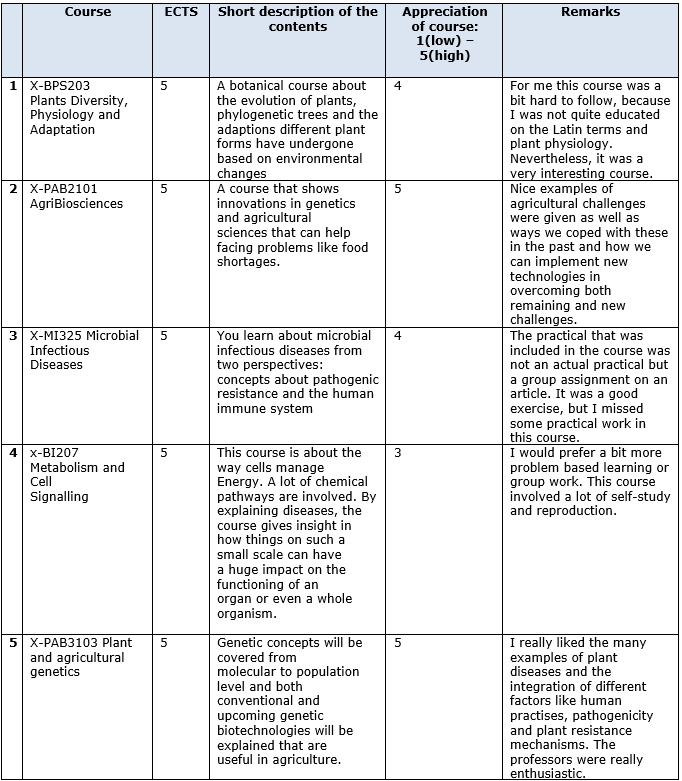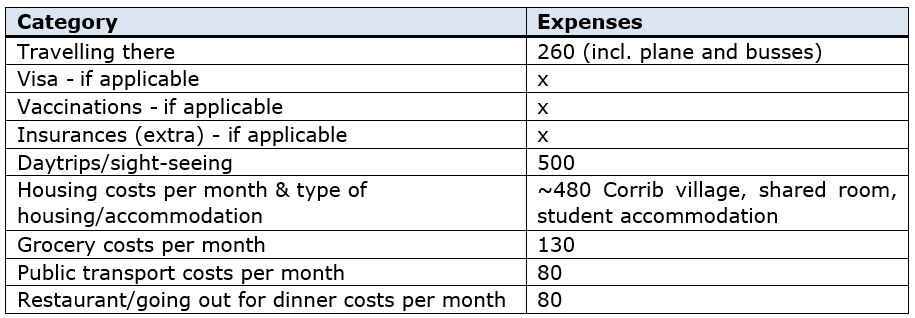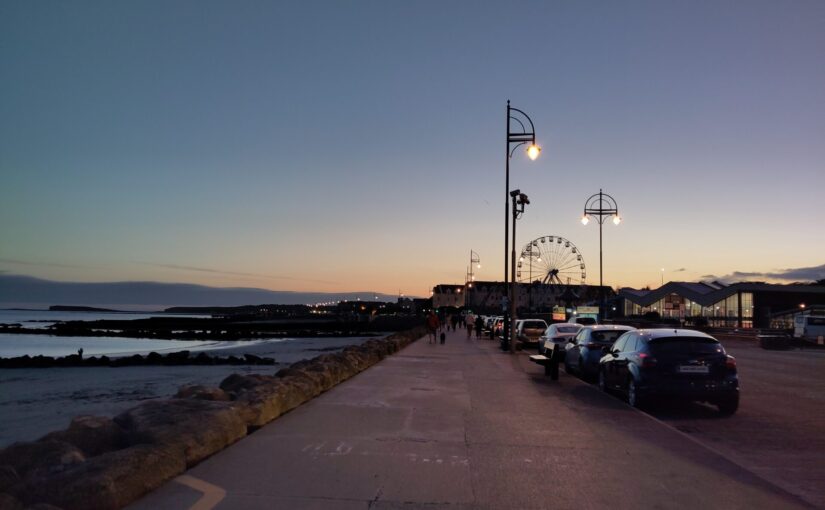Field of study in Wageningen: Biotechnology
Study period exchange: 04/01/2024 – 02/05/2024
Country (exchange): Ireland
City (exchange): Galway
University (exchange): Galway University
Faculty (exchange): College of Science and Engineering
2. Motivation for exchange
Why did you choose to go on study exchange?
I chose to go on an exchange to explore what studying abroad is like, to try something out of my comfort zone. Learning to adapt to a new environment and to settle in a land with a different culture, different people, I thought could helpful for my personal and professional development. You learn to make new friends with people that might be completely different than the ones in your personal bubble. Improving my English fluency had as well been one of my motivations.
I believe that sharing and combining knowledge and perspectives from all over the world plays a key role in the global improvement of the world we live in. Collaboration is also important here. This is one of the reasons I think exchanges in general have great value.

What is the reason you chose for this country?
It was not a straightforward choice, as I was looking for a Spanish speaking country. In Spain they did not have a lot of modules within the biotech field however, and elsewhere they only offered full Spanish teaching, no bachelor courses were given in English. It would have been too difficult to follow the lessons, so I decided to go to another country. I had heard a lot of positive feedback about Scandinavian countries, but some of my friends and housemates were also going there. I did not want to go there with a buddy, because I felt like I would pair too much and I would not experience the exchange experience to the fullest, just staying in the safe haven of knowing someone. Then there was Ireland. Ireland also appealed to me, because I did not know much about the country.
What is the reason you chose for this university?
I had read some good recensions about Galway University. The university has a vision on inclusivity and diversity, which I think is great. It also has a focus on sustainability, something I like about Wageningen and which I thought was great to see elsewhere as well. Kind of silly, but I walked around the city and at the campus on google maps and it made me smile thinking of being there. I could see myself having a life I liked in Galway. Lastly, I really liked the courses offered at Galway University.

3. Accessibility to reach destination
Take time to travel towards your exchange destination. It helps with building a connection with the country and it reduces stress. Your way traveling there can also be very fun, as you might see things underway that you want to explore more. If I did not have a tightly packed schedule before going, I would have gone there by boat, which I think is more adventurous and better for the environment.
4. University and studying
Could you provide some general information about the followed courses?

 I had sufficient possibilities to select suitable courses that were taught in English: Yes, almost every course was taught in English.
I had sufficient possibilities to select suitable courses that were taught in English: Yes, almost every course was taught in English.
I had sufficient possibilities to select suitable courses in my field of interest: Yes, too much 😉 To be fair, my field of interest is quite wide, so for me it was relatively easy to find courses I liked.
I am satisfied with the level of the courses that I followed: Yes, I feel like I have learned something new.
I am satisfied, in the end, with the selection of courses I followed: Yes, I am. At first I had made a different selection, but it appeared that they could not be combined. I would have liked to follow some other courses as well, but at some point you just got to choose.
What is it like to study there?
The way of education is very different to that in Wageningen. There are very few contact hours, practicals and group work. The focus is on lectures and self-study. Personally I like the way of teaching at the WUR better, it is a more active way of learning and it makes contact with fellow students more easy. I needed to get used to the amount of self-study, so for me the work-load was quite high, even though the level of the courses was lower compared to the ones I had followed in Wageningen. I did not buy any books over the semester. The materials provided on Canvas, a platform similar to BrightSpace, were sufficient. The examination is also very different than what I am used to. Most exams were 3h and made up out of five questions from which you needed to pick three. You are supposed to write very elaborate answers to the chosen three questions in an essay style, including an introduction and a conclusion.

What is the culture of the university?
The lectures from most courses were held in large college halls. It were mainly monologues from the teachers and there was little engagement with the students. This was very different to the teaching methods at the WUR as explained above. The course PAB3103 was a lot smaller. It was given in smaller rooms with around 25 students and the ambiance was more interactive and entertaining. The professors were very kind, very approachable and there was a lot of variation in nationalities.
What does the university offer the student additionally?
The university offers a lot more than just education. YourSpace is an online platform on which you can sign up for as many sport clubs, societies and activities as you wish. There is a huge breakfast, lunch and dining hall on campus and a kind of chill room called “the Student Hub”. At the university there is also a Pub for students, to have a bite or a drink, to dine or dance.

5. Housing-travelling-living
What are the possibilities for housing?
There are three student accommodation villages near campus: Dunlin village, Goldcrest and Corrib village. For international students there is a lottery. For me, finding accommodation was a bit stressful. In the lottery your chances are of course limited and the confirmation of the room distribution came less than one month in advance. Corrib village, the accommodation I got a room in, was quite decent. There are apartments for five persons with double and single rooms, a shared kitchen/living room and two shared bathrooms. The other villages are newer, cleaner and more modern, but also more expensive.
On a platform called “Student pad”, families can upload rooms to rent. People that manage the website warn about scams, but there are a lot of advises offered that you can follow to check whether something is safe. Rents can be very high. Prices go up to 1500 a month.
What is the culture like?
Ireland has a pub-culture: every night people go out. You find people from all ages, but mainly working people. There is a lot of life music, not only in the pubs, but also on the streets during the day, even when it rains (which is often).
The Irish people are not sensitive for rough weather or storms even. There are people that swim in the ocean every day.
Every full moon there is a “howling to the moon” event at Salthill. People from around Galway gather at the beach, howl to the full moon and jump into the ocean. Ireland is a very catholic country with lots of churches and a large amount of national – saint …- celebration days.
In Galway people eat a lot of fish and stews. Lentils, beans and potatoes are very common ingredients in the Irish cuisine.
The streets in Galway are always very lively. Especially during the weekends when people go out to the farmers market.

Could you give some information about public transport infrastructure?
Public transport is very cheap, but you need to figure out how to use it. Most of the times, paying by card is not an option, so either you need to pay cash, or with a so called “leap card”. When you buy a student leap card, which is only about 10euros, there are a lot of cheap ticket deals, especially for longer distances. I preferred walking home after nights out, because the streets were quite safe and going by taxi is quite expensive (I wouldn’t say more expensive than in the Netherlands, maybe similar or a bit cheaper) The university is very easy to reach by public transport. There are few to no cycling roads, which is a thing to keep in mind. Bikes can go on the main (car) roads, but you need to be really careful.
6. Expenses
Can you give an indication of your expenses for/during your exchange?

The price levels were in general [higher; lower; equal] in comparison to in the Netherlands: Slightly higher.

Additional remarks regarding expenses?
There is lots of differences in prices regarding super markets. Lidl or Aldi are very cheap, Dunns and Tesco quite expensive.
7. Free time
What are must-sees in the area?
Salthill promenade, The cathedral, Cork, Connemara, the ring of Kerry, Bunratty village and castle, Blarney castle, lots of castles! The cliffs of Moher, Belfast, the Giant Causeway.
What does not appear in a travel guide, but is definitely worth seeing/doing?
During the weekends there is a lot of people gathering in the city centre of Galway at the farmers market where you can buy freshly made food and crafts! And on campus there are a few (free) musea, which are worth visiting. One of them, the geographic museum, is situated inside the quadrangle. A very beautiful building in which it is worth getting lost ;).

7. Challenges & best moment abroad
What challenges did you encounter and how did you overcome them?
During my exchange I found it hard to keep in touch with some friends from home. I was very busy and I got a bit overwhelmed by everything that was new, all places I could see and people to meet. I took a step back academic wise, because I got stressed. Together with student deans I decided to drop two of my courses. I got lots of support from my house mates and from the international office and the student counselling from Galway University.
What is your best memory of your time abroad?
Something that was really bonding was a trip to Cork with a few friends, after only 1.5 weeks of knowing each other. We got into very funny conversations with taxi drivers, visited a castle, kissed the Blarney stone, walked through beautiful gardens, got out for dinner, went to a pub, danced through the streets and made silly pictures together.

8. Contact Details
Would you like to ask Therese more questions about her exchange?
Send her a mail: therese.brouwer@wur.nl

